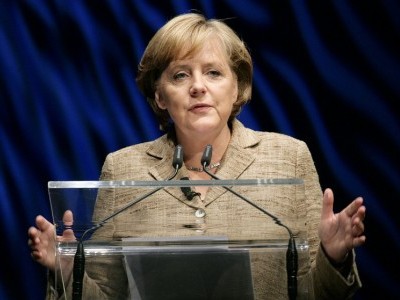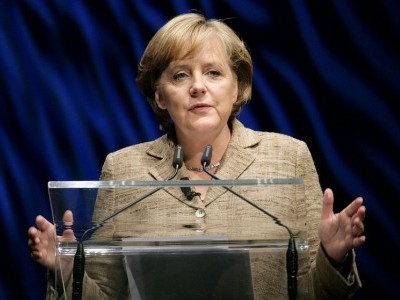 Angela MerkelPhoto: Bertelsmann StiftungThe climate bill being debated today in the U.S. House represents a “sea change” and “points to the fact that the United States [is] very serious on climate,” said German Chancellor Angela Merkel during a visit to the White House this morning. “I wish you every success. … I would not have thought [it] possible a year ago,” she continued.
Angela MerkelPhoto: Bertelsmann StiftungThe climate bill being debated today in the U.S. House represents a “sea change” and “points to the fact that the United States [is] very serious on climate,” said German Chancellor Angela Merkel during a visit to the White House this morning. “I wish you every success. … I would not have thought [it] possible a year ago,” she continued.
Speaking at a joint press conference after private talks with Obama, Merkel said the president’s work on climate change is laying the groundwork for successful climate-treaty negotiations later this year in Denmark: “I’m very gratified to note that the president feels 100 percent committed to this issue, which has become apparent in all of our talks. He wants to see to it that Copenhagen becomes a success.”
Obama reiterated his support for the House climate bill at the press conference: “I think that this legislation that we are seeking to pass indicates enormous progress from where we have been … I’m very proud of the progress that’s being made … If we can get that framework in place, I’m confident the United States can be an important partner in this process” of international climate negotiations.
From Obama’s opening statement:
I reiterated America’s commitment to stand with Germany and lead in confronting the energy and climate change crisis. And let me say, Chancellor, that I’ve been very impressed by Germany’s foresight and commitment to clean energy, which I saw in the many wind turbines as I traveled over the German landscape. And it’s my hope that the United States will match that commitment today when our House of Representatives votes on a critical energy bill that will promote a new generation of clean renewable energy in our country.
From Merkel’s opening statement (through a translator):
We talked about climate … I said that this is indeed a sea change that I see, this upcoming bill that is debated today, in the House, on climate; that this really points to the fact that the United States are very serious on climate. And this has — it should not be underestimated, what sort opportunity this brings to us, to come to a good, a sustainable result during the Copenhagen conference.
I’ve been in many, many climate legalizations and debates in my country, in the European Union. So I know what’s at stake, when you talk about reduction targets, how tricky that is, when you try to come to certain common ground.
So I wish you every success. I hope that you will come to a good result when the vote is taken. I think it’s so important that we — one, in saying we want success in Copenhagen. We need to talk to the emerging countries and the emerging economies, as to their possible contribution. But the fact that with the United States, we stand where we stand today is an enormous success, which I would have not been — which I would not have thought possible a year ago, let me be very serious.
At Obama’s press conference earlier this week, the U.S. press corps didn’t bother to ask a single question about climate and energy. But at today’s event, a German reporter stepped up to the plate with a climate question (also via a translator):
My second question is addressed to the chancellor. You already made a distinction yourself on climate policy between the House of Representatives and the Senate. How optimistic are you that more stringent rules on climate change will be successful, not only in the House but also pass through the Senate? What would be the consequence of that if they are not able to do this before the Copenhagen conference? How, then, would America deal with this situation? Have you received a reply to this?
Obama’s response:
One — even though the question wasn’t directed at me, I do want to make this point about climate change. Europe in many ways over the last several years has moved more rapidly than the United States on addressing this issue. And I’ve been very blunt and frank with Chancellor Merkel that we are still working through creating the framework where we can help lead the international effort.
I think that this legislation that we are seeking to pass indicates enormous progress from where we have been, but I think we all recognize that there’s going to be more to do and that the United States is going to have to work with Germany and other advanced economies to make sure that our obligations are clear. And then, we’re going to have to work with the emerging economies — which have enormous potential for growth but, unfortunately, also have enormous potential for contributing to greenhouse gases — so that their obligations are clear.
And I’m the first one to acknowledge that the United States over the last several years has not been where we need to be.
We’re not going to get there all in one fell swoop. But I’m very proud of the progress that’s being made, and I think that the energy bill that’s being debated in the House is an example of that progress. If we can get that framework in place, I’m confident the United States can be an important partner in this process.
Merkel’s response:
Well, you will understand my refraining from commenting in any way on the behavior of members of parliament, who, after all, are free in their decisions. That would be totally counterproductive.
But I must say that I’m very gratified to note that the president feels 100 percent committed to this issue, which has become apparent in all of our talks. He wants to see to it that Copenhagen becomes a success.
We are both convinced that this question of climate change amounts to much more than just numbers and targets. It means that we take a commitment and shoulder a responsibility for those countries in the world that will be far more heavily affected by climate change, but that we also feel committed to ensuring energy security, for our own countries’ dependence on raw materials, on commodities is also something that can bring us into very unpleasant political dependence.
So it’s always good to look at new technology to use; for example, when you have finite fuel sources, to deal with them responsibly and economically. And this is something that we’ve come out very strongly in favor in our own countries, and we do it internationally.


